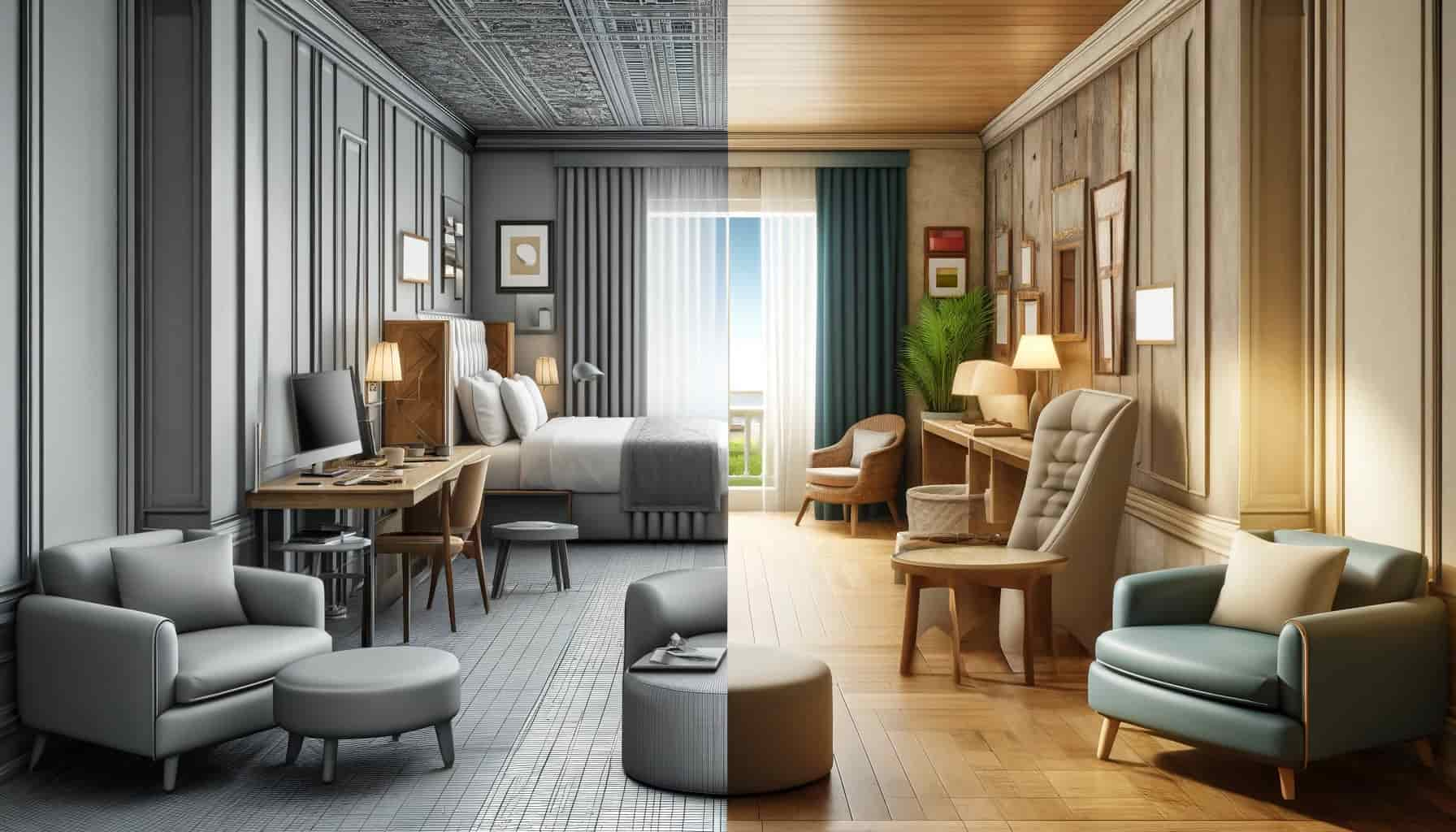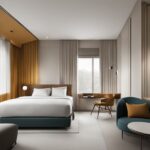The impact of furniture design in hotels goes beyond aesthetics—it shapes the guest experience. Well-chosen furniture enhances comfort, functionality, and ambiance, directly influencing guest satisfaction and reviews. Hotels that prioritize interior design and ergonomic furniture create inviting spaces that leave a lasting impression.
A study by Hospitality Net highlights that interior aesthetics affect 80% of a guest’s first impression. From the lobby to guest rooms and dining areas, each furniture piece contributes to a hotel’s overall appeal and branding.
Table of Contents
Toggle- How Furniture Design Influences Guest Experience
- Key Considerations for Hotel Furniture Design
- Conclusion
- The Advantages of Custom Luxury Hotel Furniture
- The Importance of Custom Hotel Furniture in Enhancing Guest Experience
- The Ultimate Guide to Finding Top Hotel Furniture Suppliers in Turkey
- Importance of High Quality Furniture in Hotels
- High Quality Furniture in Hotels: Essential for Guests
- The Role of Furniture in Defining Hotel Aesthetics
- The Evolution of Hotel Furniture Design Over the Years
- How to Choose the Right Upholstery for Hotel Furniture
- The Impact of Furniture Design on Guest Experience in Hotels
- Hotel Furniture and Design: Enhancing the Guest Experience
- Premium Hotel Furniture in Turkey: Elevate Your Hotel’s Interior Design
- How Do Hotels Get Furniture in the Rooms | Hotel Solutions
- Hotel Furniture Concept | Perfect Products for Your Hotel
- Top 5 Benefits of Turkish Made Hotel Furniture
- What makes a good faux leather?
- Furnishing an Apartment: 6 Tips for Choosing the Best Furniture
- Types Of Hotel Furniture You Need
- Why Turkish Made Hotel Furniture is the Best Choice for Your Business
- What is fixed furniture?
- Maximizing Your Hotels ROI with High-Quality Furniture Solutions
- Benefits of Custom Made Furniture
- Hotel Furniture Buying Guide
- Where do I buy hotel furniture in Turkey?
- How to make a hotel room feel like home
- How Often Do Hotels Change Their Interiors?
- A good hotel furniture manufacturer
- 7 signs your that hotel needs renovation
- What factors will affect hotel furniture prices?
- Should I Buy Laminate or Veneer Furniture?
- MDF cutting machine
- What are the Basic Furniture Required to Set Up a Hotel?
- What is Crib 5?
- Four Ways to Maintain Hotel Room Storage
- Characteristics of a Custom Hotel Furniture
- Popular Materials for Luxury Hotel Furniture Manufacture
- The Four Characteristics of a Hotel Furniture Design
- 4 Key Considerations for Hotel Furniture
- Hospitality Design Mistakes That Are Common
- Hotel Furniture Quality Control Checklist
- Things Your Hotel Furniture Manufacturer Should Provide
- Why we use 3D Renderings in Furniture Design
- Advantages of Custom Hotel Furniture
- Important Questions to Ask a Potential Hotel Furniture Supplier
- What Are the Guides to Contract Furniture?
- Things to consider when choosing a hotel furniture manufacturer
- Wood Veneers and Laminate Casegoods
- Wooden Furniture Care
- Hotel Furniture Buying Guide
- What Types Of Wood Are The Best For Your Luxury Sofa?
- Hotel Furniture Cushion Upholstery Care
- Leather Furniture Care; Maintaining Your Hotel Furniture
- Ten Tips for Hotel Lobby Design
- Starland Hotel Cameroon
- Hotel Furniture Turkey
- The Best Hotel Furniture Suppliers
- Hotel Furniture Manufacturers in Turkey
- Four Mistakes While Buying a Restaurant Furniture in Turkey 2021
- Selecting Booth and Sofa Seating Made in Turkey
- 10 Restaurant And Cafe Furniture Ideas From Turkey
- Five Most important Materials in Hotel Furniture Industry
- Hotel Renovations: Luxury Hospitality Furnishings made in Turkey
- How to Maintain Hotel Furniture for 10+ Years
- Commercial VS Residential Furniture Made in Turkey
- Hotel Furniture Manufacturing Industry in Turkey
How Furniture Design Influences Guest Experience
1. Enhancing Comfort and Functionality
Guests expect comfortable seating, well-placed furniture, and ergonomic design. High-end hotels invest in luxurious sofas, ergonomic beds, and adaptable workspaces to meet both leisure and business travelers’ needs. According to Hotel Management, hotels with thoughtfully designed furniture see a 20% increase in positive reviews related to comfort.
2. Strengthening Brand Identity
The impact of furniture design extends to branding. Unique furniture styles set boutique hotels apart from chain hotels, creating a distinct personality. Whether it’s modern minimalism, classic elegance, or eco-friendly interiors, hotels use furniture choices to reflect their values and target audience.
3. Creating an Inviting Atmosphere
Ambiance plays a crucial role in guest satisfaction. The right color schemes, materials, and furniture layouts influence a guest’s emotional response. Studies from Hotel News Resource show that guests feel more relaxed in well-coordinated, clutter-free spaces.
4. Maximizing Space Utilization
Hotels with strategic furniture layouts optimize space, making rooms feel larger and more welcoming. Smart design solutions, such as modular furniture and built-in storage, enhance both aesthetics and practicality.
Key Considerations for Hotel Furniture Design
1. Durability and Maintenance
Furniture should withstand high guest turnover while remaining stylish. Hotels often choose high-quality materials like hardwood, stainless steel, and leather to ensure longevity.
2. Sustainability in Hotel Furniture
Sustainable hospitality is growing. Many hotels now prefer eco-friendly furniture made from reclaimed wood, bamboo, and recycled materials. Green Lodging News states that sustainable design attracts eco-conscious travelers and reduces operational costs.
3. Customization for a Unique Look
Custom-designed furniture allows hotels to maintain brand uniqueness. Whether it’s tailor-made headboards, bespoke lounge chairs, or handcrafted tables, customization ensures a one-of-a-kind guest experience.
Conclusion
The impact of furniture design in hotels is undeniable. It enhances guest comfort, strengthens brand identity, and improves ambiance. Investing in high-quality, sustainable, and functional furniture ensures a memorable guest experience and positive reviews.
Hotels that align their furniture choices with guest expectations will stay ahead in the competitive hospitality industry. To explore the latest hospitality furniture trends, visit Hospitality Design.




2 Responses
hi
peace
good morning
Do you also supply products for three accommodation units,
For each unit – bedroom, living room, kitchen,
And a large yard, with a blessing.?
Is it possible to get a catalog with prices?
Can you design an idea for me?
Thank you and have a good day.
Hello, could you give information about your project? You can send us an email.
in**@*******************pt.com
Thanks